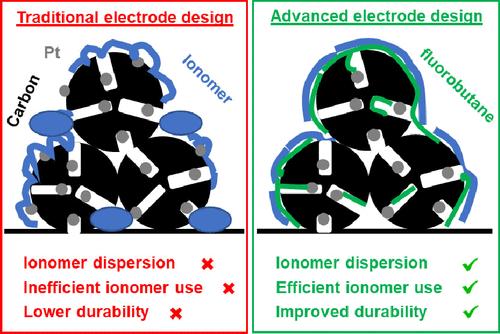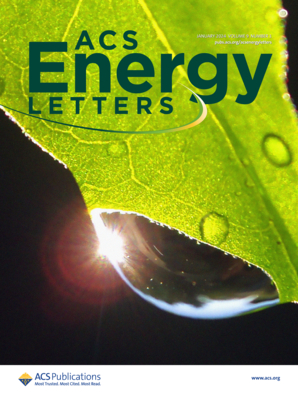Durable Fuel Cell Electrode Design via Efficient Distribution of the Acidic Ionomer
IF 18.2
1区 材料科学
Q1 CHEMISTRY, PHYSICAL
引用次数: 0
Abstract
Proton Exchange Membrane (PEM) fuel cell based electrochemical energy conversion systems represent a cleaner alternative to replace diesel-based internal combustion engines for heavy-duty vehicle (HDV) applications. Enhanced durability of the fuel cell cathode is critical to decrease the total cost of ownership (TCO) of the vehicles. The fuel cell cathode comprises a platinum-based catalyst and perfluorosulfonic (PFSA) ionomer, which is needed to aid in proton conductivity, but it also creates an acidic environment for platinum dissolution. Here we report a new surface treatment process of the catalyst using an organic fluorocarbon molecule to efficiently distribute the ionomer and decrease the level of Pt dissolution. This allows for a ∼2-fold decrease in ionomer usage without compromising proton conductivity (∼25 mS cm–1) due to the condensed, superprotonic ionomer pathways, thereby significantly improving platinum surface area retention. The structure of the electrode design and plausible reasons for the improved durability are discussed in detail here.

通过酸性离聚体的有效分布设计耐用燃料电池电极
基于质子交换膜(PEM)燃料电池的电化学能量转换系统代表了重型车辆(HDV)应用中替代柴油内燃机的一种更清洁的选择。提高燃料电池阴极的耐用性对于降低车辆的总拥有成本(TCO)至关重要。燃料电池阴极包括铂基催化剂和全氟磺酸(PFSA)离聚体,这是帮助质子电导率所必需的,但它也为铂的溶解创造了酸性环境。本文报道了一种利用有机氟碳分子对催化剂进行表面处理的新工艺,以有效地分布离聚体并降低铂的溶解水平。这允许在不影响质子电导率(~ 25 mS cm-1)的情况下,将离子单体的使用减少2倍,这是由于冷凝的超质子离子单体途径,从而显着提高了铂的表面积保留。本文详细讨论了电极设计的结构和提高耐用性的合理原因。
本文章由计算机程序翻译,如有差异,请以英文原文为准。
求助全文
约1分钟内获得全文
求助全文
来源期刊

ACS Energy Letters
Energy-Renewable Energy, Sustainability and the Environment
CiteScore
31.20
自引率
5.00%
发文量
469
审稿时长
1 months
期刊介绍:
ACS Energy Letters is a monthly journal that publishes papers reporting new scientific advances in energy research. The journal focuses on topics that are of interest to scientists working in the fundamental and applied sciences. Rapid publication is a central criterion for acceptance, and the journal is known for its quick publication times, with an average of 4-6 weeks from submission to web publication in As Soon As Publishable format.
ACS Energy Letters is ranked as the number one journal in the Web of Science Electrochemistry category. It also ranks within the top 10 journals for Physical Chemistry, Energy & Fuels, and Nanoscience & Nanotechnology.
The journal offers several types of articles, including Letters, Energy Express, Perspectives, Reviews, Editorials, Viewpoints and Energy Focus. Additionally, authors have the option to submit videos that summarize or support the information presented in a Perspective or Review article, which can be highlighted on the journal's website. ACS Energy Letters is abstracted and indexed in Chemical Abstracts Service/SciFinder, EBSCO-summon, PubMed, Web of Science, Scopus and Portico.
 求助内容:
求助内容: 应助结果提醒方式:
应助结果提醒方式:


